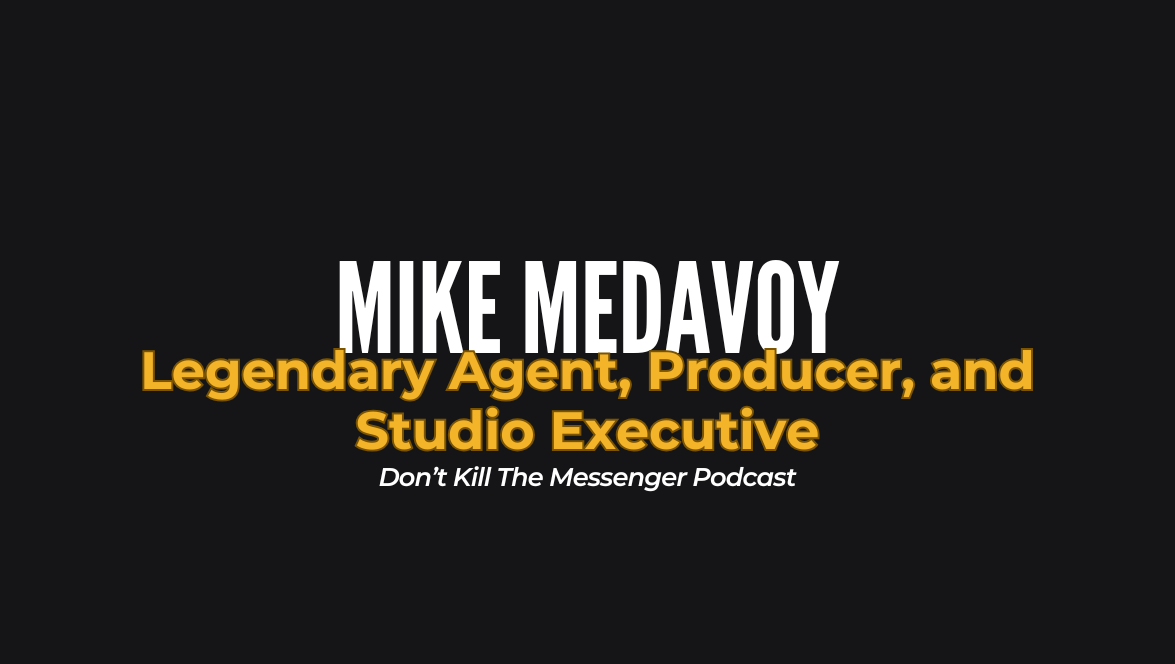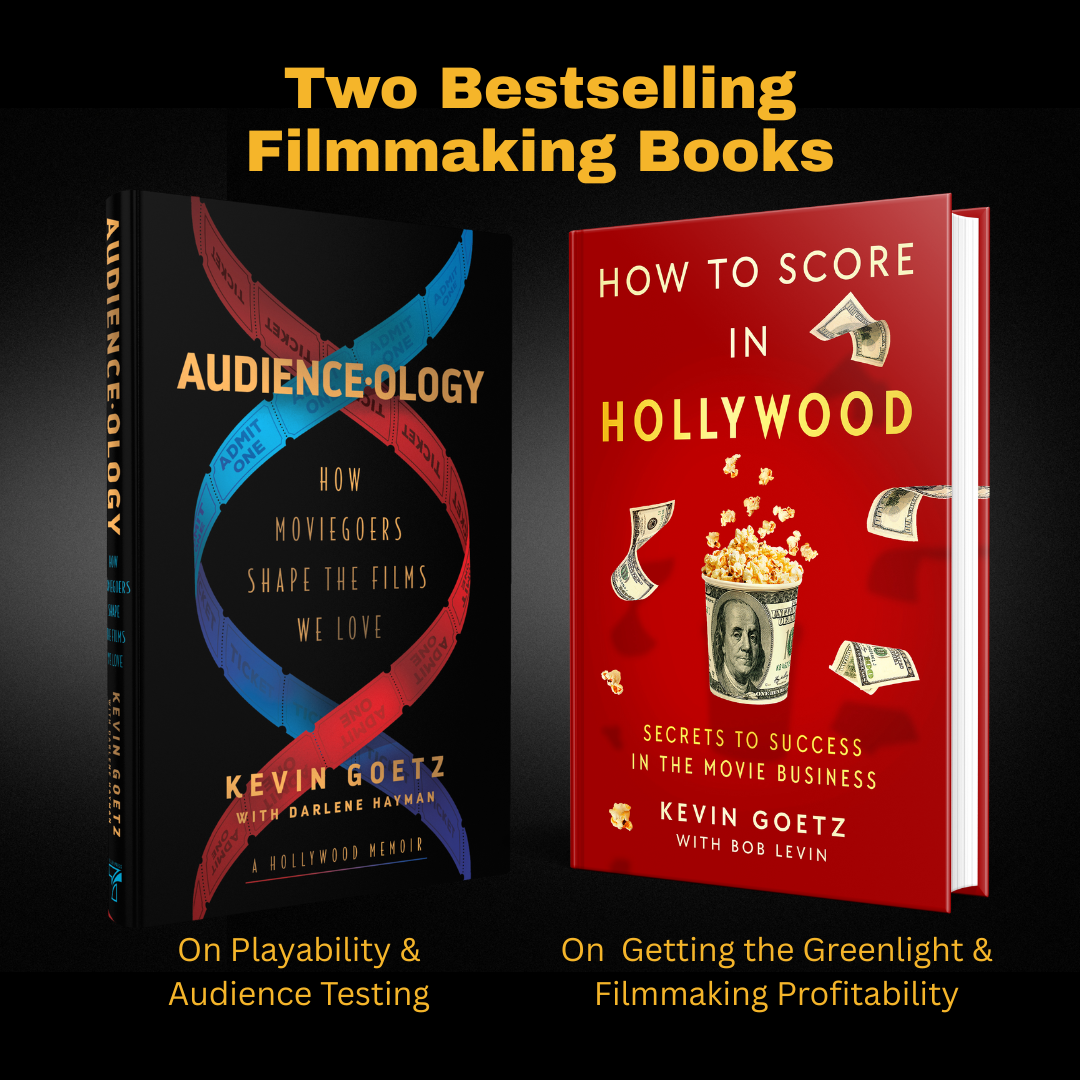
Mike Medavoy on His Five-Decade Journey from Mailroom to Hollywood Legend
In a captivating episode of “Don’t Kill the Messenger,” host Kevin Goetz sits down with legendary film producer and studio executive Mike Medavoy. With a career spanning over five decades, Medavoy has been intimately involved with over 300 feature films, with seven winning Best Picture Oscars. His remarkable journey from the mailroom to Hollywood has shaped some of cinema’s most important films, including Rocky, One Flew Over the Cuckoo’s Nest, Apocalypse Now, and The Silence of the Lambs.
Kevin Goetz on Mike Medavoy:
I can only say that on behalf of our listeners, on behalf of so many people who’ve worked with you, we’re grateful to you, man. We’re grateful for your contributions to the movie business, but I’m grateful to you also as a friend and someone that I’ve gotten to know over the last decade or so, and you’re one of my heroes in this business.
Early Life and Global Upbringing
Born in Shanghai in 1941 to Russian-Ukrainian Jewish parents, Medavoy’s multicultural upbringing provided him with a unique perspective. When asked about his roots, Medavoy explains:
I was born in Shanghai. My father was born in the Ukraine, although at the time, I guess it was part of Russia. So he is Russian. My mother was born in Manchuria in Harbin. So we came from all over the East. And my dad wound up in Shanghai in 1926… We went to Chile in 1947, 48… I learned Spanish there. Went to school, learned how to play soccer.
Breaking into Hollywood
After graduating from UCLA and serving in the US Army Reserve, Medavoy’s Hollywood journey began in Universal’s mailroom alongside future filmmakers Walter Hill and John Badham. His ambition was evident from the start:
I went to see Lew Wasserman and then he said, what do you wanna do? I said, well, I can’t think of anything here that I wanna do, ’cause I’m not really qualified for anything. And I said, you were an agent. He said, well, is there any job that you want? And I said, well, the only job I want is one you’re not gonna give me, so I’m just gonna keep moving. He said, what’s that? I said, yours, to which he laughed and sent me out.
From Agent to Studio Executive
Medavoy’s talent for spotting and nurturing creative voices emerged during his time as an agent, where he represented Steven Spielberg among other rising stars. Speaking about Spielberg, Medavoy reflects:
The truth of the matter is that timing is everything, right? And it’s the right time at the right place. At the time that I became Steven’s agent, he was just coming up and working hard, and he was doing the kind of thing that a young guy should do. He’d go to Universal; he’d work with the sound guy that was there… He became friends with the mucky-mucks at Universal, and he got his craft better and better and became better and better. And that’s what got him going.
United Artists Success
At United Artists, Medavoy helped shepherd an unprecedented streak of Best Picture Oscar winners. This remarkable run included One Flew Over the Cuckoo’s Nest, Rocky, and Annie Hall in consecutive years (1975-1977), establishing him as one of Hollywood’s most successful executives.
Formation of Orion Pictures
The founding of Orion Pictures with Arthur Krim, Eric Pleskow, and other former UA executives marked another pivotal chapter in Medavoy’s career. When reflecting on this period, he’s quick to share credit:
I don’t like to think of myself as being the only one that made it work. I was thinking last night, actually… All the movies that I didn’t do either because Bob and Eric didn’t want to do it, or the ones that I did that turned out to be really good. But the ones that I wanted to do that turned out to be really great that I should have done.
Stories Behind the Classics
Medavoy’s candid anecdotes about famous productions reveal his straightforward approach to filmmaking. On Network, he recalls questioning Sidney Lumet’s comedic abilities:
I remember sitting down with the writer-director, Paddy Chayefsky, when he told me that he wanted Sidney Lumet to direct it. And I said, Sidney Lumet, he doesn’t have a funny bone in his body. What’s the last Sidney Lumet comedy you’ve seen? He said, well, I think he can be funny. I’ve talked to him. And I said, my last memory of Sidney Lumet’s movies is Pawnbroker, where he takes a nail and sticks it in his hand. I said, I mean, if you think that’s funny, then you and I disagree. But everybody wanted to do it and we did it. And I’m obviously very proud of having been a part of it.
For Sleepless in Seattle, Medavoy’s instincts about Nora Ephron proved crucial:
It was a really good movie and I don’t think Tom Hanks was expected to do that. The director Nora, everybody loved Nora. But she had done a movie at Fox that did not work and I asked her to come in and rewrite it and then I figured if I saw what she’d written, that it would tell me whether she could direct it or not. And she did a great job on the script and therefore the movie.
The Changing Industry
As someone who has witnessed multiple Hollywood transformations, Medavoy offers a candid assessment of cinema’s evolution:
The movies aren’t what they used to be. I mean, you used to go to the movies, millions of people went to the movies. Now people are watching most of the stuff on television. And that’s a smaller screen, obviously. But everything’s changing. Our lives are changing in front of us, especially now.
On the quality of modern films, he adds: “When there’s so much that’s being thrown out there, the truth of the matter is that the majority of is gonna be mediocre.”
Personal Health Journey
With the same directness he brings to his professional assessments, Medavoy opens up about his health challenges:
Not long ago I was told that I had myeloma and that I had to get that cured. And I’ve been working on that… We’re not here forever. I’m gonna do the best I can and then I’ll be in six feet under and hopefully I’ll have made a difference. And that’s it.
Family and Legacy
When discussing what’s most important to him now, Medavoy emphasizes family: “What’s most important is I continue to work, continue with my family. I’d like to see my kids really have a good life and enjoy themselves. They don’t have to do what I did. They don’t have to be who I am.”
His humility extends to his self-assessment as a father. When asked if he was a good dad, he replies: “I think you gotta ask them that question…They’ll say yes, but I don’t know if they’re just [being kind]. When I think about it, I think about what are the mistakes you made? And there are plenty.”
Advice for Filmmakers
For emerging talents, Medavoy’s advice is characteristically straightforward. He recommends The Story of Film, saying simply: “I had nothing to do with it. I just saw it and I wish I’d seen it before I started in the business.”
Throughout his career, Mike Medavoy has demonstrated an exceptional ability to balance commercial instincts with artistic integrity. His journey from immigrant roots to Hollywood influence exemplifies the American dream while his candid reflections offer invaluable insights for anyone interested in the art and business of filmmaking.
Don’t miss the full conversation on “Don’t Kill the Messenger” to hear more about Chris Landon’s Hollywood journey and insights into his groundbreaking films.
Don’t Kill the Messenger, hosted by movie and entertainment research expert Kevin Goetz, brings his book Audienceology to life. This bi-monthly podcast takes a peek behind the filmmaking curtain as Kevin talks with famous filmmakers, studio executives, stars, and other creatives about movies, filmmaking, audience test screenings, and much more.
For more information about Mike Medavoy:
For more information about Kevin Goetz:
Website: www.KevinGoetz360.com
Audienceology Book: https://www.simonandschuster.com/books/Audience-ology/Kevin-Goetz/9781982186678
Facebook, Twitter, Instagram: @KevinGoetz360
Linked In @Kevin Goetz
Screen Engine/ASI Website: www.ScreenEngineASI.com
For deeper insights into what makes a movie resonate and succeed, don’t miss the upcoming book How to Score in Hollywood (September 2025) by entertainment research expert Kevin Goetz with Bob Levin. This book unveils the secrets behind success and profitability in the movie business, showcasing how smart, data-driven decisions—from development through release—can help filmmakers minimize risks and maximize returns.
Kevin, the founder and CEO of Screen Engine/ASI, is also the bestselling author of Audience-ology, host of the popular Don’t Kill the Messenger podcast, and a speaker who educates the filmmaking community through keynotes and global presentations. In 2024, he was honored with the prestigious American Cinematheque Power of Cinema Award for his transformative contributions to the film industry.






